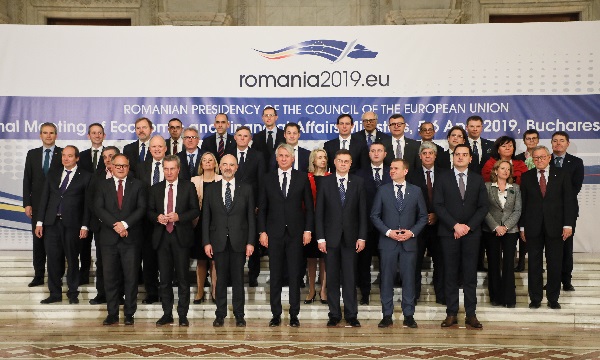 Eurogroup;
Credit: Council of the EU
Eurogroup;
Credit: Council of the EU
On 5 April 2019, the Eurogroup approved Luxembourg's Draft Budget Plan (PPB) 2019 during its meeting in Bucharest, Romania.
Within the framework of the Romanian Presidency of the Council of the European Union, Pierre Gramegna, Luxembourg Minister of Finance, travelled to Bucharest from 4-6 April 2019 to participate in the meetings of the Eurogroup and Informal Ecofin, as well as the Eurofi seminar dedicated to financial services.
On the second day of this visit, the Eurogroup notably approved Luxembourg's PPB 2019. In its statement, the Eurogroup welcomed the Government's budgetary choices, aimed at maintaining a high level of investment and accompanying growth, while ensuring a balanced budget. The Eurogroup stressed that Luxembourg has not only met, but exceeded, its medium-term objective (OMT), which confirms the good health of its public finances.
The Eurogroup thus confirmed the conclusions formulated by the European Commission in its opinion of 22 March 2019, which considered that Luxembourg's draft budget is in full compliance with the provisions of the Stability Pact and of Growth (PSC). It also confirmed that the public debt should continue to fall over the next few years, remaining at all times below the threshold of 60% of GDP laid down in the Treaties, as well as at the 30% threshold set in the coalition agreement. The Commission therefore invited the Luxembourg authorities to adopt and implement the draft budget tabled by Pierre Gramegna in the Chamber of Deputies on 5 March 2019.
The Eurogroup also discussed the macroeconomic situation in Europe, as well as topics related to the supervision of the financial sector. The ministers similarly exchanged views on ways, particularly in the area of governance, to further strengthen the Economic and Monetary Union and to best prepare it for a possible new financial crisis. It should be noted that the Eurogroup has also assessed the progress made by the Greek authorities in implementing the reform commitments set out in the Eurogroup declaration of 22 June 2018. On this basis, it has issued a favourable opinion for the disbursement of the next tranche of aid, worth €970 million.
Pierre Gramegna also took the opportunity to invite his counterparts to the General Assembly of the Asian Investment Bank for Infrastructure, which will be held from 12 to 13 July 2019 in Luxembourg.
In the context of the Ecofin meetings of 5-6 April 2019, ministers discussed the completion of the Capital Markets Union and the Banking Union, as well as the priorities of the next institutional cycle, which will follow the European elections of 26 May 2019. This is the first time that the social partners have been invited to participate in the debates within the framework of an informal Ecofin. Finally, the ministers discussed taxation and growth. In this context, Pierre Gramegna welcomed the progress made at the level of the G20 and the OECD to establish common rules and recalled the importance of respecting the level playing field, in order to guarantee the effectiveness of the measures to be put in place and to preserve the competitiveness of the European economy vis-à-vis its main American and Asian competitors. He also asked that there be more discussion at the Ecofin level of the Franco-German proposal presented to the G20, to better understand its scope.
In the margins of the Eurogroup and Ecofin meetings, Pierre Gramegna participated in the Eurofi Seminar, an event bringing together more than 800 participants every six months, representing both the public authorities and the main private actors in the European financial sector. In particular, Pierre Gramegna intervened, alongside his French counterpart Bruno Le Maire, during a session entitled: "The viability of the euro zone 20 years after its creation". The two ministers drew a positive assessment of the evolution of euro area governance following the financial crisis. Pierre Gramegna also insisted that any deepening of the euro area will have to take into account three complementary ideas: an increase in investments, particularly in infrastructure, structural reforms in the interest of competitiveness and convergence, as well as risk reduction as a prerequisite for strengthening solidarity between member states.
On this occasion, Minister Gramegna similarly met with senior leaders of international groups present in Luxembourg to discuss their strategic choices, especially in view of the latest developments relating to Brexit.








